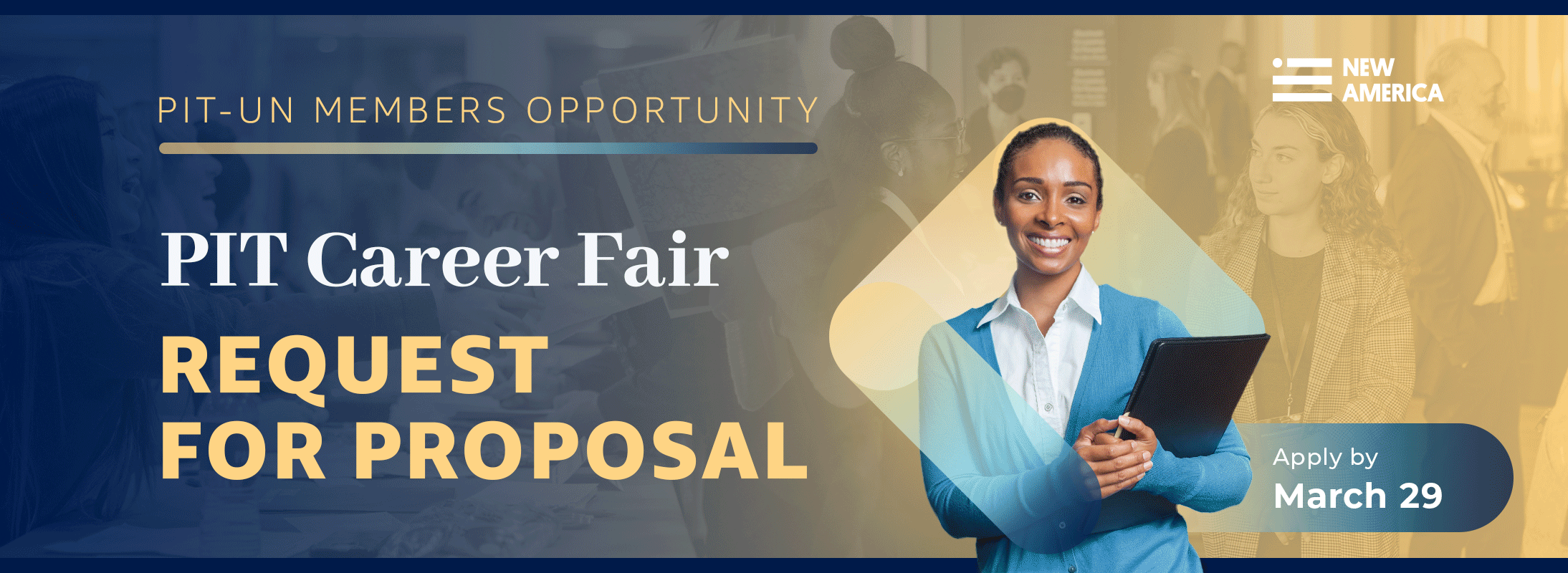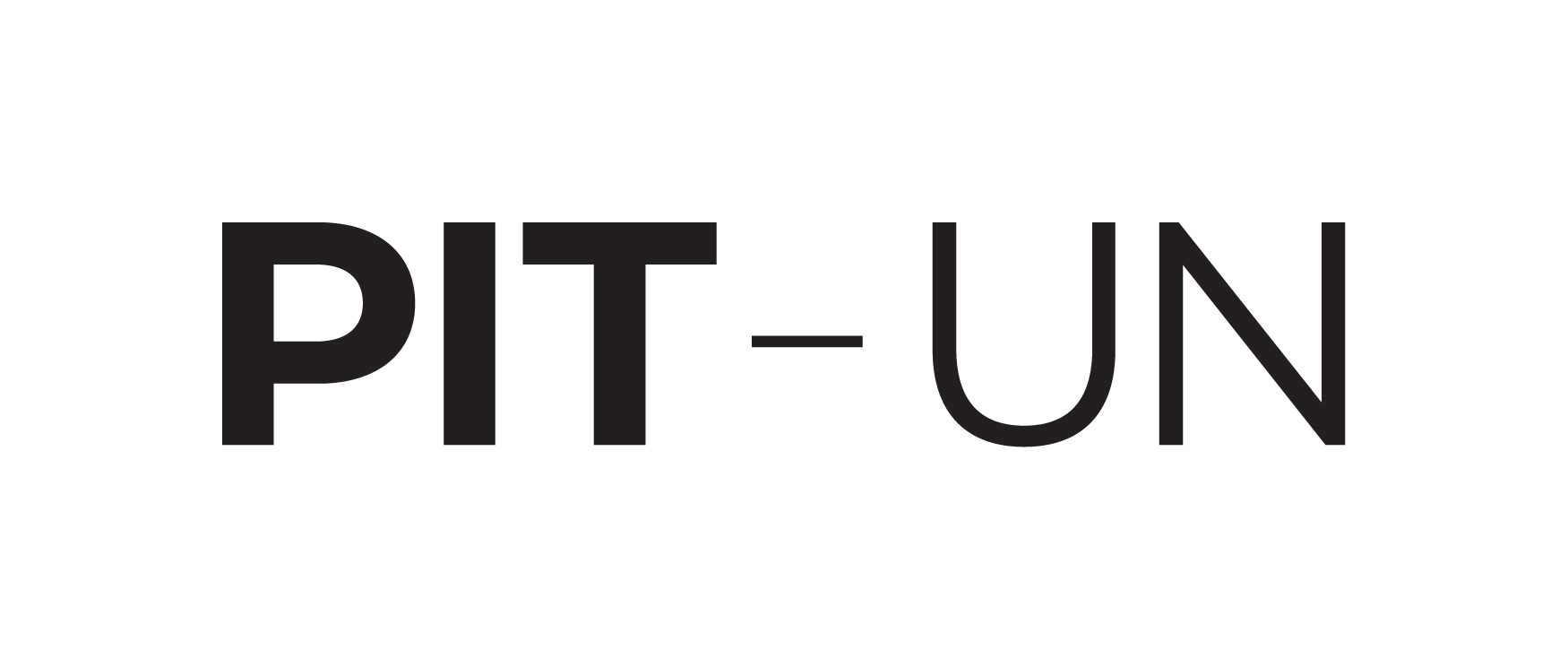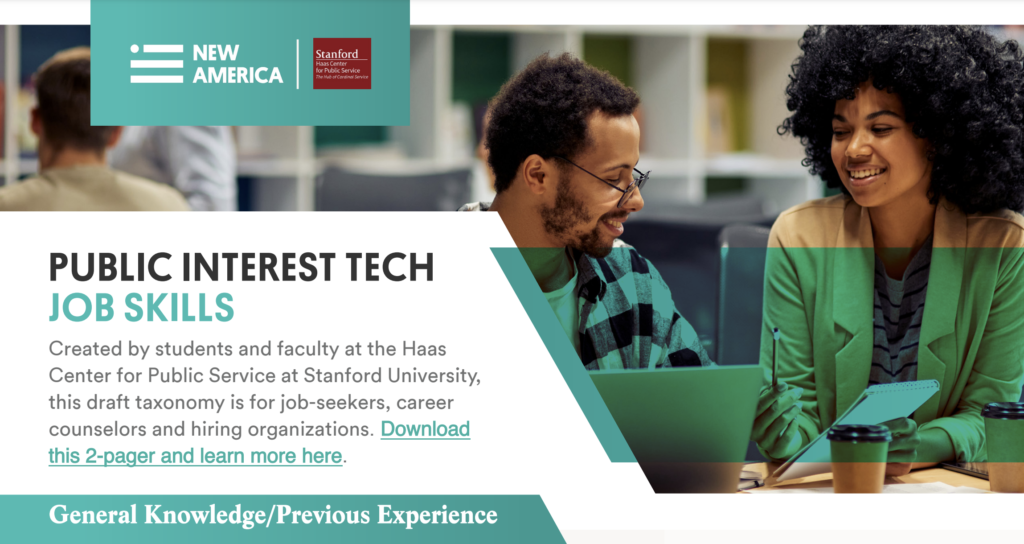
2024 - 2025 Application Window Has Closed
The Public Interest Technology University Network (PIT-UN) is seeking proposals from its member institutions’ Career Placement or Career Counseling Service staff for Career Fair(s) to connect students with employers and community partners who are designing, developing, and deploying technology that serves the public interest – a growing and diverse field known as public interest technology (PIT).
A successful PIT Career Fair will be a collaboration between a member institution’s Career Placement or Career Counseling Office, their PIT-UN Designees or PIT-UN Network Challenge Principal Investigators, and regional employers and/or employer organizations to ensure the event facilitates opportunities that are related not just to technology, but explicitly to public interest technology.
To find your institution’s PIT-UN Designee or Network Challenge Principal Investigators, visit our Member Directory.
Successful proposals will connect students with industry representatives, employers, non-profits, and government agencies that can provide extended learning opportunities related to PIT. These opportunities should have defined objectives and provide flexible instruction or study outside of the classroom, including but not limited to:
Internships
Apprenticeship
Community service
Work-based learning
Job Shadows
PIT-UN, funded through New Venture Fund, anticipates making multiple awards. Grantees must be affiliated with a PIT-UN member institution’s Student Success or Career Services Office and must be the primary recipient of grant funds.
2023 Regional or Multi-Institution Career Fair grantees who have submitted the narrative and financial reconciliation reports are eligible to submit a proposal for a new round of funding. 2023 Regional or Multi-Institution Career Fair grantees who have not submitted the final reports (narrative and financial reconciliation reports) are not eligible to submit a proposal in this round of grant funding.
The grant aims to empower PIT-UN member institutions’ Career Services staff to become critical players in growing and diversifying the PIT pipeline.
Issuance of this RFP in no way constitutes a commitment by PIT-UN to make grant awards. Applications will be evaluated after the due date, and PIT-UN reserves the right to issue partial awards as determined to be in the Network’s best interest.
The Public Interest Technology University Network’s Challenge grants are funded through the support of the Ford Foundation, Hewlett Foundation, Mastercard Impact Fund with support from Mastercard Center for Inclusive Growth, the Raikes Foundation, Schmidt Futures, and the Siegel Family Endowment.
The Network Challenge is a project of the New Venture Fund (NVF), a 501(c)(3) public charity that supports innovative and effective public interest projects.
New to PIT?
Download our 1-pager to learn more about:
- The definition of PIT
- Examples of PIT in action
- How to get into PIT
- Books and Job Boards
Subscribe to the PIT UNiverse Newsletter
Core Elements and Outcomes
Core Element 1: Career Pipelines
The proposed Career Fair articulates a strategy for strengthening the PIT pipeline by making clear connections between PIT-related coursework, research centers or programs at your institution, and the needs of regional employers. Career pipelines offer a clear sequence of education coursework and/or training credentials aligned with employer-validated work readiness standards and competencies, and integrate academic and occupational skills training. The proposed Career Fair should:
Address critical needs in the regional community and/or economy for PIT-trained technologists.
Offer opportunities for students to apply PIT skills and knowledge to technology challenges and engage in cutting-edge research to solve the challenges facing our nation.
Prioritize support for disadvantaged students, students with disabilities, and individuals such as: BIPOC, Black, LatinX, Indigenous, and people of color; low-income students; students seeking work in rural communities and/or communities with unemployed and underemployed workers.
Offer sessions where students can view presentations from employers and sponsors and hear leaders from attending organizations answer questions as part of roundtable-style discussions.
Demonstrate the value of career opportunities facilitated by the Career Fair as students go on to seek a well-paying career in PIT.
Be regional in scope, or multi-institutional, producing lasting benefits for students and employers.
Core Element 2: Strategic Alignment with the Workforce System and Other Stakeholders
Successful applicants will demonstrate that they have performed outreach to and gathered information on efforts to align technology with the public interest, including entities that can provide data on the characteristics and skills needed by businesses, nonprofits, and government agencies in the region.
For purposes of this RFP proposal, a “community” or “region” is a city, county, or other political subdivision of a state, or a group of post-secondary institutions of a state or adjacent states.
-
Applicants should leverage existing resources to ensure that the project complements and does not duplicate existing regional programs and should strategically leverage support to ensure participant success in the classroom and the workplace.
-
The proposal should address three types of key stakeholders in their region: (a) post-secondary institutions, (b) the public workforce system, and (c) businesses, non-profits, and community or civic organizations.
Collaboration With Regional Initiatives and Entities
Applicants are strongly encouraged to collaborate with regional initiatives and entities that align with the proposed project. Applicants are also encouraged to include deep and sustained partnerships with organizations whose mission is to contribute to a growing body of research and best practices in public interest technology.
Eligibility
Grantees must be affiliated with PIT-UN member institutions’ Career Placement / Services Office, and must be the primary recipient of grant funds.
2023 Regional or Multi-Institution Career Fair grantees who have submitted the narrative and financial reconciliation reports are eligible to submit a proposal for a new round of funding.
2023 Regional or Multi-Institution Career Fair grantees who have not submitted the final reports (narrative and financial reconciliation reports) are not eligible to submit a proposal in this round of grant funding.
Eligible single institutions of higher education that identify and engage partners outside of the institution and within a defined region that will contribute to the project.
The scope of proposals should reflect the individual institution’s ability to implement this project, and must include appropriate and necessary infrastructure and equipment costs for a successful regional or multi-institution PIT career fair. PIT-UN encourages single institution applicants to focus their proposed project on one specific project strategy that can be fully implemented within the grant period, with a scope that appropriately reflects the size of the requested funding amount, as opposed to implementing a series of complex strategies that may be challenging to complete within the grant period.
Eligible consortium applicants are consortia of two or more eligible higher education institutions.
PIT-UN encourages consortium applicants to consider infrastructure and equipment costs that will enable them to deliver the proposed multi-institution career fair-career exploration program successfully. PIT-UN consortium applicants should focus their proposed project on a specific strategy that benefits all institutional members, that can be fully implemented within the grant period, and that appropriately reflects the size of the requested funding amount.
Grant Awards
The range of awards is up to $20,000. The number and size of awards will depend on the proposals received and available funds. Career fair activities must be completed by April 30, 2025, and final reports submitted by June 16, 2025.
Issuance of this RFP in no way constitutes a commitment by PIT-UN to make grant awards. Applications will be evaluated after the due date, and PIT-UN reserves the right to issue partial awards as determined to be in the Network’s best interest.
Opportunity Timeline
RFP submission window opens
San Jose State University Career Fair 2023 Recap & Open Office Hours
RFP Final Questions Submissions Window Closed
RFP Question Answers Posted
City University of New York Career Fair Recap & Open Office Hours
Carnegie Mellon University Career Fair Recap & Open Office Hours
Open Office Hours
Open Office Hours
RFP Submission Window Closes
Winners Notified by the week of April 22, 2024
Grant Term
Snapshot After Career Fair Survey
Final Reports Due
FAQs & Questions
Grant informational sessions will be held weekly on Fridays using Zoom, starting on February 23, 2024, from noon EST through 12:50 pm EST until the grant RFP close date on March 29, 2024.
Questions about this RFP can be sent to [email protected]
- a list of main staff for the project
- a completed W-8BEN-E IRS Form
- AND the NVF Electronic Funds Transfer form if your proposal is selected.
- a list of main staff for the project
- a list of the Board of Directors/Trustees
- the institution’s 990
- audited financials, or letter of determination
- a completed W-8BEN-E IRS Form
- AND the NVF Electronic Funds Transfer form if your proposal is selected.
Onsite career fairs are easier to recruit employers to; virtual fairs generally draw half of registered students and employees. We discourage holding hybrid fairs, as there is a significant lack of student interest now that total online delivery has ended.
Interview slots are not required, however we expect features that will make the process easy for employers to speak to participants about available opportunities.
Allowable expenses are expenses directly related to producing the best experience for employers and for students attending the fair.
Part of the charge for a PIT Career Fair is to expose existing and new employers to the concept of public interest technology and the value PIT students bring to the workforce. Currently, all PIT-UN institutions have PIT experts on their campuses, Designees, Network Challenge Grantees, and practitioners who can assist you in translating PIT for your employers.
Incentives such as travel and accommodations for small to medium companies to attend the fair are acceptable. Allowable incentives also apply to local and state governmental agencies. Incentives can also be used for booth space, breakfast and lunch for all employers, and special luncheons for other sponsors.
Not necessarily, though it is important to create incentives so employers feel invested in the process. Employers should commit to on-campus interviews within 10 days of the career fair, so students can look forward to a possible on-campus interview within a short period of time.
Expenses to consider to produce the best experience for employers which is best for students attending post-secondary education include:
- Incentives such as travel and accommodations for small to medium companies. (This also applies to local and state governmental agencies.)
- Table space for booths
- Supplying electrical outlets for all booths
- Advertising
- increased social media and highlighting them with webinars or chats or by hyping which employers are attending.
- Paper, banners, and social media adds
- Breakfast and Lunch for all employers
- Marquee Sponsor special luncheon


